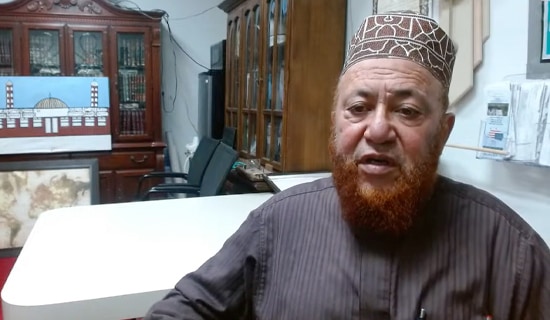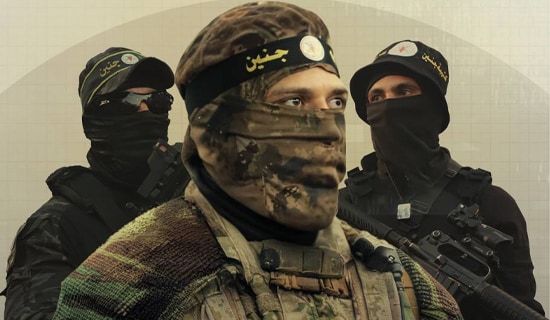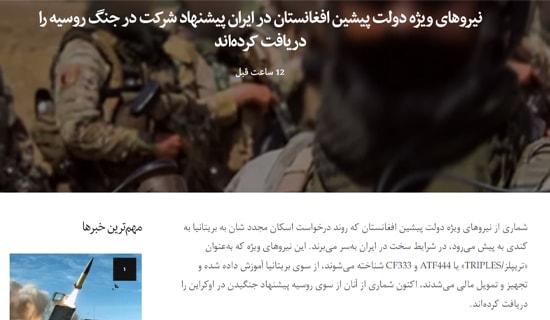Introduction
September saw a sharp rise in attacks on U.S. bases and logistic convoys in Iraq linked to Iran-backed militias. These militias are similarly involved in a series of abductions and assassinations against Iraqi protesters.
The recent escalation in attacks on U.S. targets and the continuous Iranian manipulation of Iraq's politics has prompted two firm positions: one from Washington and the second from Iraq's highest Shi'ite authority in Najaf.
In response to the attacks on U.S. targets, Washington warned Baghdad that it would close its embassy if the Iraqi government failed to stop these attacks. It was reported that, in one of his calls with Iraqi President Barham Salih and Iraqi Prime Minister Mustafa Al-Kadhimi, U.S Secretary of State Mike Pompeo told the Iraqi leadership that the U.S. troops would "kill every Kata'ib Hezbollah member as American diplomats depart Baghdad."[1]
Nearly a week before the U.S. warning, Iraq's Highest Shi'ite Authority, Grand Ayatollah Ali Al-Sistani issued a public statement defining the urgent priorities on which the Iraqi government needs to act to steer the country away from Iran's regional influence and secure a better political outcome during the next elections.
Reminding Al-Kadhimi of the promises he made when he first took office, the top cleric emphasized the urgent need for the government to enforce the rule of law and restore the state's stature through a series of measures, including disarming militias and dismantling their financial network.
The following report will examine these developments and their implications:
Al-Sistani Extends Support To Al-Kadhimi's Reform Plan
On September 13, 2020, following his meeting with Jeanine Hennis-Plasschaert, special representative of the UN secretary-general for Iraq, Iraq's Grand Ayatollah Ali Al-Sistani issued a statement calling on Prime Minister Mustafa Al-Kadhimi's government to move forward with its plans to hold early elections, confiscate illegal arms, contain militias, fight corruption, and seek justice for all who were killed, injured or abducted during the 2019-2020 protests.[2]

Al-Sistani during his meeting with UN representative Jeanine Hennis-Plasschaert (source: Sistani.org).
To highlight the need for the government to address the threat of Iran-backed militias, the top cleric said that "the current government is required to continue and proceed firmly to implement social justice, control border crossings, improve the performance of security forces to reach a high degree of discipline and professionalism, enforce the stature of the state and confiscate unauthorized weapons... The government must not allow certain groups to divide the country into enclaves controlled by force of arms under different excuses, far from the rule of law," Al-Sistani said.
On early elections, Al-Sistani emphasized that "the parliamentary elections scheduled to take place next year are of great importance, and they must be conducted according to a fair law, far from the private interests of some political blocs and parties, to allow the results a high degree of credibility."
"Integrity and transparency must be taken into account in the various stages of the elections, and the supervision and monitoring should be done in coordination with the UN mission to Iraq," added Al-Sistani, who further stressed that "no person or group, no side with a particular view, no regional or international actor may seize the will of the Iraqi people and impose its will on them."
Al-Sistani's statement, which did not refer to the presence of U.S. forces in any way, was met with silence from Iran-backed politicians and militias.
Iran's Reaction To Al-Sistani's Statement
On September 26, the editor-in-chief of the Tehran daily Kayhan, Hussein Shariatmadari, slammed the statement in an op-ed, saying it was "beneath his position."[3]
Concerned that a fair election under UN supervision could set the stage for detracting from Iran's influence in the Iraqi parliament, Shariatmadari said that "inviting the UN to monitor the country's elections is tantamount to declaring a country's bankruptcy. It is a pessimistic view toward the nation and an optimistic approach toward foreigners."

Hussein Shariatmadari's op-ed on Al-Sistani's statement (source: Ultrairaq.com).
Shariatmadari further suggested that Al-Sistani's call for UN supervision could be "an error" in the transcript of the minutes of his meeting with Hennis-Plasschaert, urging the top cleric to issue a correction. However, no retraction has been issued by Al-Sistani's circles.
Reaction By Al-Kadhimi To Al-Sistani's Statement
Encouraged by Al-Sistani's remarks, on the day the statement was issued, PM Al-Kadhimi ordered the security forces to arrest key officials believed to be linked to the Popular Mobilization Units (PMU)'s financial mechanism.[4] The arrests included: Ahmed Al-Sa'adi, director of the Retirement Commission; Bahaa Abdul-Hussein, director of Qi Card, a company that was contracted to facilitate the payment of retirement pensions; Adel Khadr, Director of the Agricultural Bank; Shaker Al-Zamili, Chairman of Baghdad Investment Commission; and Sa'ad Hoyadi, Director in Iraq's Investment Commission.[5]
Reportedly, their confessions uncovered a money-laundering network used by Iran-backed politicians and groups. Al-Kadhimi further ordered the closure of PMU offices in all Iraqi airports, which allegedly were often used to facilitate the escape of fugitives out of the country, drug trafficking, and weapon smuggling. Local reports claimed that interrogations of the detainees are based on a detailed investigation dossier compiled by the late Iraqi politician Ahmed Al-Chalabi who, just before his death in 2015, traced a financial network that used Iraq's oil revenue to finance armed factions in Syria and Yemen.[6]
The U.S. Warning To Close Its Embassy If Attacks Continue, And Al-Kadhimi's Reaction
On September 22, local media claimed that Iraqi President Barham Salih received a phone call from Secretary of State Mike Pompeo, who told him that Washington is planning to close its embassy in Baghdad if the government failed to stop militias' attacks on its bases and convoys.[7]
In September alone, more than 19 rocket attacks targeted the U.S. Embassy and 25 IED attacks targeted U.S. logistical convoys. One IED attack targeted a U.K. diplomatic vehicle in Baghdad.[8]
On September 29, in response to a rocket attack that landed in a residential area close to a military base housing U.S. forces and killed six Iraqi civilians, the U.S. Department of State emphasized in a statement that these "militias pose an unacceptable danger to everyone in Iraq, from diplomatic officials and facilities to Iraqi activists and families."[9]
On the same day, Al-Kadhimi said during a cabinet session that "there are those who claim to be Iraqis, yet they are working to turn the land of Iraq into a battlefield," noting that he received assurances from both the U.S. and Iran that they do not want Iraq to be a stage for a conflict."[10]
In a follow up, Ahmad Mulla Talal, the spokesman for the prime minister, announced that seven security officials who were in charge of protecting areas targeted by rocket and IED attacks had been detained. He noted that the repercussions of closing the U.S. Embassy would be "catastrophic," adding that "the Iraqi government has gone a long way to prevent the closure of the [U.S.] embassy, and political powers should do their part to spare Iraq the repercussions."[11]
The next day, on September 30, Al-Kadhimi said in a meeting with 25 diplomats from 25 countries, including the U.S. ambassador to Baghdad, that the attacks on the embassies are meant to "weaken his government and isolate Iraq from the rest of the international community."[12]
He noted that protecting diplomats is the duty of his government, vowing to take action against the "outlawed groups" behind these attacks. Following the meeting, the diplomats issued a joint statement expressing their deep concern at the rise in the number and sophistication of attacks against diplomatic premises in Iraq. The statement said: "We welcome the actions that Prime Minister Al-Kadhimi and his government have taken to address these concerns."[13]

Al-Kadhimi during his meeting with 25 diplomats to discuss the U.S. warning (source: Nasnews.com).
On September 30, Iraqi Foreign Minister Fuad Hussein said he hopes Washington will reconsider its decision to close its diplomatic mission in Baghdad, as a group of ambassadors expressed their willingness to help Iraq tackle security challenges.[14]
In a news conference, Hussein described the U.S. threat to close the U.S. Embassy "dangerous" because "there is a possibility that the American withdrawal from Baghdad will lead to other [embassy] withdrawals."
He said Iraq acknowledged the domestic climate in the U.S. ahead of the November presidential election, which might have precipitated the warning.
"The [U.S.] decision is a wrong one, it was taken at the wrong time and the wrong place. It would send a message to the armed groups and extremists perpetuating the attacks." He added that "it is the [Iraqi] government's duty to take action and it has taken security measures in Baghdad's Green Zone and Baghdad International Airport."
Reaction By PMU To U.S. Warning
Several Iran-backed clerics, politicians, and senior militia commanders, who appear to be concerned that the U.S. embassy closure would entail U.S. airstrikes targeting their leadership and militias, issued statements condemning the attacks on diplomatic missions.
On September 24, Popular Mobilization Units (PMU) Chairman Falih Al-Fayadh said in a statement that the PMU is an official Iraqi military force that abides by the orders of the commander-in-chief (i.e., Al-Kadhimi) and therefore he confirms that "it is not responsible for entities that use the PMU's name in suspicious and illegal military activity targeting foreign or national civilian interests."[15] On the same day, he announced the firing of two high-ranking PMU commanders; Hamid Al-Jaza'ri, who was accused of attacking protesters, and Waad Al-Qaddo, who was accused of crimes against minorities in the Ninevah Plains.[16]
Leader of the PMU-affiliated Al-Fatah parliamentary bloc Hadi Al-Amiri echoed the same sentiment on September 24. He condemned the attacks on diplomatic missions and foreign troops, saying that "such actions weaken the state and its stature, they are unacceptable and lead to dangerous results."[17]
On September 23, Shi'ite populist cleric Muqtada Al-Sadr called on the Iraqi government to form a military committee to investigate attacks on diplomatic missions and government facilities and to announce results to the public within a fixed timetable, adding that legal measures should be taken against these assailants. He also called on the PMU to disown the groups behind these attacks.
However, some Iran-backed Shi'ite groups took a different position. Kata'ib Hezbollah, the Al-Nujaba' Movement, and the Sayad Al-Shuhada Brigades slammed Pompeo for issuing a warning to Iraq and criticized Iraqi politicians and PMU leaders who condemned the attacks following the U.S. warning.
On September 25, Abu Ali Al-Askari, the military commander of Kataib Hezbollah threatened to target U.S. forces, saying: "The language of threats and intimidation [by Secretary Pompeo] will pound your army into dust mercilessly."[18]
On September 26, Akram Al-Ka'abi, top commander of Al-Nujaba' Movement said in a lengthy statement that "everyone who declared their intention not to target diplomatic missions does not mean to refer to the U.S. Embassy of Evil, but rather the real diplomatic missions." He added: "I will join them in demanding the closure of this military intelligence barracks [the U.S. Embassy], which has become a safe haven for Zionist delegations and a focus for sabotage, assassinations, and sowing chaos with a destructive malevolence that is not hidden to anyone familiar with the situation."[19]
Abu Alaa Wala'i from the Sayed Al-Shuhada Brigades tweeted on September 26, that it is "a pleasure to hear the Americans screaming, the louder their scream, the more pain they suffer... If the resisters had confidence that the U.S. withdrawal will happen, they would have waited but he who killed the martyrs [Soleimani and Al-Muhandis] is not trustworthy and the land can be cleansed only by cutting the legs of the occupiers."[20]
Qais Al-Khazali's Asa'ib Ahl Al-Haq said in a statement on September 27 that he does not consider the U.S. Embassy to be a diplomatic mission, saying that "it has turned into a military base of an occupying force." However, he said, attacking the U.S. Embassy has no value at this time. He also rejected Al-Sadr's call to form an investigation committee to look into militia attacks on foreign missions, saying that it would encourage the U.S. to prolong its presence in Iraq.[21]
Following the U.S. warning, some new Shi'ite rogue groups surfaced vowing to fight against the U.S. forces after other Iran-backed groups "abandoned jihad," referring to PMU factions that condemned the attacks on diplomatic missions.[22]
In the days following the U.S. warning, Shi'ite rogue militias continued to carry out minor IED attacks on U.S. logistic convoys. However, on September 30, the Kurdistan Regional Government's counterterrorism force stated that six rockets fired from the Nineveh Plain, which is controlled by PMU militias, landed near the Erbil International Airport that houses U.S. forces.[23]
Iran's Reaction To The U.S. Warning
On September 18, Iran's Foreign Ministry Spokesman Saeed Khatibzadeh responded to the attack on the U.K. diplomatic vehicle by condemning "any attack on any diplomatic missions."
On September 25, Iran's Supreme Leader Ayatollah Ali Khamenei wrote on Twitter: "Imam Hassan (peace be upon him) avoided entering a military war with the enemy... and he stopped the military war to start his political war, his cultural war, his media war and his Islamic war." The metaphoric use of Imam Hassan is often used in Shi'ite terminology to express willingness to avoid a conflict.[24]
The Iranian leadership went even further when it extended an official apology to Iraq's Al-Sistani over the insulting op-ed in Kayhan mentioned above. Iranian Foreign Minister Mohammad Javad Zarif said in a tweet on September 28 that "his eminence, Ayatollah Al-Sistani is the fortress of Iraq, the security valve for the region, and an asset for the entire Islamic world. Iran appreciates the role of his eminence in establishing security and stability in Iraq, preserving its sovereignty and territorial integrity, getting rid of the occupation forces, and building a new Iraq according to the requirements of its brotherly people."[25]
Conclusions
The U.S. warning to close its embassy in Baghdad has sent waves of concern through Tehran and some of its Iraqi affiliates, who fear that the closure will be followed by imminent U.S. strikes that would target their leaderships, similar to the one that killed Qassem Soleimani and Abu Mahdi Al-Muhandis on January 3.
The warning has drawn a dividing line between, on the one side, PMU factions who are willing to abide by the Iraqi government's authority, and, on the other side, the outlawed militias which, by firing rockets on Erbil Airport, are sending a message of defiance to the U.S. warning and to Al-Kadhimi's efforts to contain the crisis.
In the meantime, Al-Sistani's message, the first since Al-Kadhimi took office, underlines his desire to see the Iraqi government take bold steps toward loosening Iran's grip over the country's national interests, including disarming Iran-backed militias, targeting their financial network, and holding them accountable for their use of violence against protesters.
Al-Sistani's refraining from mentioning the U.S. highlights that his priorities are completely different from those of the Iran-backed groups. He is more concerned about squeezing Iran's influence in Iraq, which is in line with Washington's desire to curb the Iran-backed militias' attacks. Hence, Al-Kadhimi's delayed military confrontation with these militias seems more pressing now that he has the top cleric on his side.
Realizing the disastrous economic and military repercussions of closing the embassy in Iraq, Al-Kadhimi must act quickly and firmly against these outlawed militias to convince Washington to reverse its decision. His failure to act now will, at best, likely drag Iraq's crippling economy under U.S. secondary sanctions.
Demonstrating its seriousness in this regard, Washington, which plans to snap back sanctions on Tehran next month, granted Baghdad on September 24 a 60-day sanctions waiver during which it can buy gas from Iran, instead of the 120-day waiver issued in the summer. This shorter waiver period signals U.S. frustration with Al-Kadhimi's slow approach in distancing Baghdad from Tehran and ending its meddling in Iraq's internal affairs. Being so clearly emboldened by Al-Sistani, it remains to be seen if in the coming weeks Al-Kadhimi will act, as many in Iraq expect he will.[26]
*S Ali is a research fellow at MEMRI.
[1] Nytimes.com, September 29, 2020.
[2] Sistani.org, September 13, 2020.
[3] Ultrairaq.ultrasawt.com, September 26, 2020.
[4] Alarab.app, September 16, 2020.
[5] Aljarida.com, September 29, 2020.
[6] Aljarida.com, September 29, 2020.
[7] Almadenahnews.com, September 27, 2020.
[8] Rudaw.net, September 23, 2020.
[9] Nasnews.com, September 30, 2020.
[10] Nasnews.com, September 30, 2020.
[11] Nasnews.com, September 30, 2020.
[12] Nasnews.com, September 30, 2020.
[13] Twitter.com/sblhickey, September 30, 2020.
[14] Rudaw.net, September 30, 2020.
[15] Al -hashed.net, September 24, 2020.
[16] Shafaq.com, September 24, 2020.
[17] Sotaliraq.com, September 25, 2020.
[18] Twitter.com/abu_ali_313, September 25, 2020.
[19] Twitter.com/Akram_Alkabee, September 26, 2020.
[20] Twitter.com/aboalaa_alwalae, September 26, 2020.
[21] Ar.mehrnews.com, September 27, 2020.
[22]See MEMRI JTTM report New Shi'ite Groups In Iraq Vow To Fight U.S. Forces After Other Iran-Backed Groups 'Abandoned Jihad', September 28, 2020.
[23] Rudaw.net, September 30, 2020.
[24] Twitter.com/ar_khamenei September 25, 2020.
[25] Twitter.com/JZarif, September 28, 2020.
[26] Alaraby.co.uk, September 24,2020.





